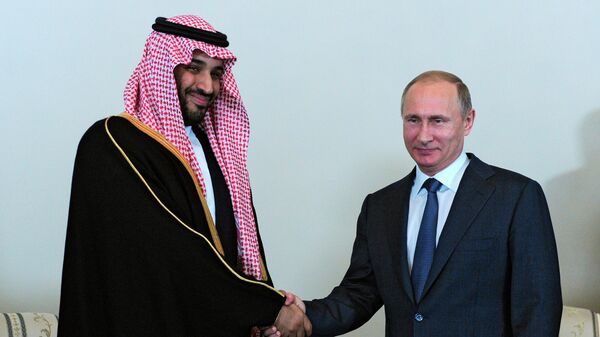Royal Intrigue
Let's get everything out of the way before we begin – Mohammed bin Salman is reviled by many abroad, and especially in the Middle East, for his disastrous War on Yemen and unbridled bullying of Qatar. He's been a deleteriously disruptive force since becoming Defense Minister in January 2015, and it's easy to understand why he doesn't have many supporters outside his country. Mohammed bin Salman's military policies have rightly attracted strong criticism for their wanton use of force and bullying, and his efforts to forge an anti-Iranian "Arab NATO" have thus far been spectacularly in vain.
While such a move was anticipated by many for a while already, the timing of it caught a lot of people off guard, given the regional uncertainty that Saudi Arabia finds itself in the center of, ironically by its very own hand. Questions are swirling in certain social media circles over whether Mohammed bin Nayef is capable of staging a "counter-coup" to reclaim his right to the throne and depose of the up-and-coming "warrior prince," whom some sources have alleged is unpopular among some members of the royal family due to the gaping wound that he's inflicted on the Kingdom's coffers as a result of the War on Yemen. Nevertheless, such worries were likely quashed by Mohammed bin Nayef's dismissal from the influential and powerful position of Interior Minister, and the succession shake-up appears to have gone smoothly.
Multipolar Benefits
It's not widely known by many, but Mohammed bin Salman juggles his Defense Minister responsibilities with energy and economic ones through his decision-making role at state oil colossus Aramco and through the leadership of the newly-formed Council on Economic and Development Affairs, respectively. Moreover, he's the brainchild and public face behind the ambitious "Vision 2030" which seeks to rapidly modernize Saudi Arabia's economy away from its energy-exporting dependency and towards more tangible real-sector output. Mohammed bin Salman's signature project envisions a combination of wide-ranging structural reforms, geo-economic leveraging, and large-scale investments to turn the Kingdom into a functioning post-oil economy for when that time ultimately comes.
China:
The real-sector economic trajectory that Chinese-Saudi relations are slated to travel along builds upon the two sides' already gigantic energy ties and could give a boost to their incipient military ones, too. Saudi Arabia is among China's top oil suppliers, which means that Mohammed bin Salman is one of President Xi Jingping's most important counterparts because of the former's influential decision-making role at Aramco. About military relations, the $65 billion in deals that King Salman signed in Beijing include a plan to construct a Chinese drone factory in the Kingdom, which shows that Saudi Arabia’s August 2016 purchase of this technology from China was successful in serving as the foundation for an expanded military partnership.
Russia:
It's therefore not for naught that Mohammed bin Salman hailed his country's relations with Russia as "seeing one of their best stages at this moment" during talks with President Putin at SPIEF, and it also explains why a spokeswoman for Russia's Federal Service for Military-Technical Cooperation said earlier this week that Moscow is continuing its military-technical discussions with Riyadh in spite of the latter's gargantuan $110-350 billion arms deal with Washington last month. Unbeknownst to anyone but the most astute observers, Russia's actually been in talks with Saudi Arabia over the export of T-90 battle tanks, which if successfully completed sometime in the future could serve as the basis for an expanded military partnership along the lines of what Saudi Arabia and China are presently pursuing.
Asset or Liability?
Russia and China are poised to see their own interests promoted if Mohammed bin Salman becomes the next Saudi King, but there are also several factors working against this admittedly optimistic scenario. Here's a brief run-down of the obstacles that stand in their way, as well as the points which work to their advantage:
Obstacles:
- Inexperience
Mohammed bin Salman is easily guided into reckless foreign policy schemes such as the War on Yemen, a deepening region-wide proxy war against Iran, and the bullying of Qatar, and he'll have to significantly mature before taking the throne in order for Russia and China to see him as a reliable long-term partner. - Blood-Soaked Legacy
Although having been Defense Minister for only two and a half years, Mohammed bin Salman already has a lot of blood on his hands, and he might build up such a terrible reputation by the time he becomes King that Russia and China could calculate that the soft power stigma of associating with him could offset any potential gains. - "Deep State" Rivalries
Mohammed bin Salman has to ensure that he lasts long enough to become King in the first place and then rule without any restraint, meaning that he must continually fend off any royal and/or clerical conspiracies which threaten to depose him or fundamentally weaken his power to carry out his promised reforms.
Advantages:
- Huge Responsibilities
Despite his inexperience, Mohammed bin Salman is already in charge of the most important facets of the Kingdom's military, energy, and economic-investment policies, meaning that he has the chance to "learn on the job" how things should properly be done and one day avoid the pitfalls that have plagued him thus far. - Reformist Plans
Mohammed bin Salman can never atone for the thousands of innocent lives which have been lost during his senseless War on Yemen, but the successful implementation of his Vision 2030 comprehensive reform project could preserve the strategic multilaterally-beneficial appeal that Russia and China see in him. - Youth Support
Over half of Saudi Arabia's population is under 25 years old and is said to hold the young Mohammed bin Salman in extremely high regard, which is very important because this demographic might come out in the street to support him in the event of a royalist-clerical coup attempt by the (literally) "old guard."
Verdict:
Mohammed bin Salman's appointment as the Saudi Crown Prince is a very promising move which aligns with the grand Russia and China's grand strategic interests, not least of which because it stands to put a "friendly face" in power, though he'll have to moderate his regional policy and mature in order to become a truly reliable partner.
The views expressed in this article are solely those of the author and do not necessarily reflect the official position of Sputnik.






